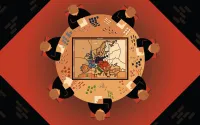Common Dreams / Published on Thursday, December 2, 2004 by the lndependent/UK
The control room at the Union Carbide factory in Bhopal, India, looks like something from one of those post-apocalyptic science fiction movies. Cow dung is splattered across the floor. There are rows upon rows of broken dials, their plastic covers smashed, the needles stuck. The scale models of the plant are shrouded in thick spiders' webs. A dirty sign on the wall reads "Safety is everybody's business".
Outside, eagles are nesting in the long-defunct flare tower. They swing overhead from time to time. Fluffy bits of asbestos float on the breeze. They are strewn across the ground, caught on gorse bushes. The vast metal hulk of the factory is silent, huge tangles of metal pipes and tubes running from tank to tank, slowly rusting in the Bhopal sun.
 A handicapped man walks past a graffiti urging death on former Union Carbide chairman Warren Anderson outside its closed factory in the central Indian city of Bhopal December 2, 2004. More than 3,500 died soon after the plant, now a subsidiary of Dow Chemicals Co., spewed clouds of highly toxic methyl isocyanate into the city, according to government figures. India continues to pursue criminal charges against Anderson, now in the United States. Union Carbide and its partner, Union Carbide India Ltd, and Dow Chemicals which took over UCC in 2001, have publicly stated they bear no responsibility for the leak, its consequences or the poisons still seeping into the ground. December 2, 2004 marks the 20th anniversary of what many describe as the 'chemical Hiroshima'. REUTERS/Raj Patidar A handicapped man walks past a graffiti urging death on former Union Carbide chairman Warren Anderson outside its closed factory in the central Indian city of Bhopal December 2, 2004. More than 3,500 died soon after the plant, now a subsidiary of Dow Chemicals Co., spewed clouds of highly toxic methyl isocyanate into the city, according to government figures. India continues to pursue criminal charges against Anderson, now in the United States. Union Carbide and its partner, Union Carbide India Ltd, and Dow Chemicals which took over UCC in 2001, have publicly stated they bear no responsibility for the leak, its consequences or the poisons still seeping into the ground. December 2, 2004 marks the 20th anniversary of what many describe as the 'chemical Hiroshima'. REUTERS/Raj Patidar |
You would not think, to look at Bhopal today, that it happened here. It's a charming city, built around the edges of a lake. Fountains spume lake water in columns near the shore, a solitary boatman is slowly working his way out across a lake that shimmers with the early morning haze.
There was a mayoral election here a couple of weeks ago. Trucks festooned with brightly colored banners made their way through the streets, blaring slogans from their loudspeakers. There was barely a mention of the Bhopal disaster. You would think the city had moved on, that it was all in the past.
But that could not be further from the truth. Round the corner from the rusting metal skeleton of the Union Carbide factory lies a warehouse. You can wander inside if you want, but the watchman who guards the site won't come with you. He is too scared. Step inside and the smell hits you. It is hard to breathe, almost impossible. It's a terrible smell, something deeply unhealthy, something chemical and poisonous. Huge mounds of brown toxic sludge lie in the warehouse, piled 10 feet high.
The Union Carbide factory has never been cleaned up. It is still poisoning Bhopal. Recent tests showed the chemicals still at the factory site have contaminated the ground water, which is used as drinking water by some of the poor neighborhoods around the factory. There is mercury lying on the ground inside the site, according to a former foreman who worked for Union Carbide.
Dow Chemicals, the company which took Union Carbide over in a merger, refuses to clean up the site. It claims it is no longer liable because it sold its shares in an Indian subsidiary.
It doesn't end there. "In the past 20 years, I didn't live through a single day without painkillers, without a tablet," says Rashida Bee, one of the survivors of the disaster. Today Ms Bee, and thousands like her, are still suffering the long-term effects of poisoning by the gas that leaked from the Union Carbide factory that night.
Many of the survivors, when you speak to them, have to break off from time to time because of the Bhopal cough. It's a long, agonizing rattle that makes you wonder whether they can draw air back into their lungs. Women have menstrual irregularities. Others have more severe handicaps. Ms Bee's nephew was blinded by the gas.
And all of them have received just £300 in compensation from Union Carbide. This is as much the fault of the Indian government as of the American company. In 1986, the Indian government agreed a deal in which Union Carbide paid just $470m (£245m) in compensation to victims. The government agreed to drop a legal case in which Union Carbide was expected to end up having to pay as much as $3bn in compensation. It agreed that the payment would end all Union Carbide's liability for the disaster. It never consulted the victims. Today, 15 years later, less than half of that money has been paid to the victims. The rest is still sitting in the Indian government's coffers, earning interest for the government, but not for its rightful owners, the victims of Bhopal. The injured have received 25,000 rupees each (£300). The relatives of those who died received 100,000 rupees (£1,200).
One victim, Bhano Bee, told how in 1986 her six-year-old son developed intestinal problems because of the gas. "I spent a lot of money on his treatment, more than 50,000 rupees (£600), and we only got 25,000 rupees (£300) compensation each from the government," she said.
Today, Rashida Bee is sitting in the yard where some of the women survivors try to scrape by a living making basic stationery products. Many have lost their husbands and are the sole breadwinners for the families. Many are too sick to hold down any other job.
Big mosquitoes that can bite right through your clothes hover as she talks. When they bite, you feel a sharp pain like a bee sting. Ms Bee is sitting with her friend and fellow activist Champa Devi Shukla.
"If I had died at that point it would have been better, because the pain was unbearable," Ms Bee says, remembering the night of the accident. "I couldn't open my eyes. When I finally opened them a little I saw dead people all over the road, and people were walking over them. There were people crying out to God to kill them because the pain was so unbearable." The pain has not gone away. Both Ms Bee's parents died of the long-term effects of the disaster. So did her sister-in-law. Her nephew, the son of the sister-in-law who died, went blind. "I saw so many deaths in my family, that's where I get the source of my energy to fight against the multinationals like Union Carbide," she says.
 Activists fighting for victims of the world's worst industrial accident in 1984 have accused the Indian government of dragging its feet on the extradition of the main accused in the case, US industrialist Warren Anderson. (AFP/HO) Activists fighting for victims of the world's worst industrial accident in 1984 have accused the Indian government of dragging its feet on the extradition of the main accused in the case, US industrialist Warren Anderson. (AFP/HO) |
"In 1992, my eldest son committed suicide. He was very sick, he got fed up with life. He took a pesticide called Sulphas. He was 20. He was in a lot of pain. My daughter is paralyzed. She got married but she was not treated well by her in-laws. Both my daughters got married but both are back living in my house now.
"The deaths of my husband and son inspired me to take up activism. I thought nothing was left in my life, but I realized many others had lost their relatives and loved ones so I took up activism." Together, Ms Bee and Ms Shukla have won several awards for their activism. This year, they were joint winners of the Goldman Environmental Award, and they proudly display their awards for the camera.
But, for all the accolades, the world is ignoring these eloquent women. They are the forgotten. They are celebrated from time to time for their courage and determination, wheeled out as examples of tough women from the Third World looking for justice from the multinationals. But their demands are ignored. Nothing gets done.
Union Carbide has abandoned the victims of the Bhopal disaster. So has the Indian government. So have the local politicians of the Madhya Pradesh state government, busy touring around the city trying to get re-elected.
In 2004, Shahid Noor, who was orphaned as a child in the disaster, went on a hunger strike to protest against the state government's failure to live up to its promise to provide jobs for the orphans. "After four days, the police came and took away the tent where we were sitting," he says. "We sat two more days without a tent. The police took us to hospital and forcefully administered glucose. The government said they couldn't give us jobs but they would give us loans. We refused."
The memories of that night still live with the survivors. "My father got sick and we took him to the hospital," Mr Noor recounts. "We left him there. When I got there I heard my mother had died. It was 3 December 1984, the night after the disaster. Around midnight or 1am she died. The same evening after I got the news of my mother's death I heard my father had died.
"The most tragic part of the story is we were in that house for around eight, 10 days. My brother had also died but my uncle didn't tell us. He told me after several days and I went and saw the grave. Later, I learnt that he was the first to die."
Mr Noor is talking in his tiny first floor apartment just a few streets from the factory. Here, it is easy to imagine the terror of that night. There is a power cut and the flat is plunged into darkness. Without light, it is hard enough to feel your way down the steep narrow staircase to the street. They had to do it blinded by fumes that burnt their eyes.
As he talks, his wife burns the chili powder she has been cooking in the kitchen. All the time, that has been the recurrent description from the survivors of the gas. "It was like when some one has burnt chili powder." You feel it catching at the back of your throat. The survivors face this reminder all the time.
Across the city, among the paper files of the industrial records office, T R Chouhan makes the case against Union Carbide and, by extension, its new owners, Dow Chemicals. He should know, he used to work as foreman of the MIC plant, the one that leaked that night. "I was supposed to get six months' safety training, but after just 15 days training they told me to take charge of the MIC sub-system. I refused and they threatened to fire me. In the end, they agreed to one month's training," he says.
"The most vital safety instrument in the plant, the temperature indicator alarm, which could have warned of the disaster, was not working because of a design fault. It went wrong after just two weeks and never worked again. In the original design, there was supposed to be a back-up but it was never installed.
"There was a loud siren installed to warn the public of a leak, but four months before the disaster they changed it to a muted siren because there were so many leaks from the plant and they didn't want people to panic." The US has refused to extradite Warren Anderson, the former chief executive officer of Union Carbide, to face trial in India. Dow Chemicals claims it has discharged its liability. It may sleep easy at night. But the victims of Bhopal do not.






